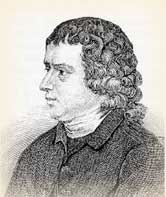 Atria seniors gather for Sunday church service.
Atria seniors gather for Sunday church service.By Neil Earle
 Atria seniors gather for Sunday church service.
Atria seniors gather for Sunday church service.When invited to speak at our Seniors Church at Rancho Atria in San Dimas, California, I have been taking the group through the stories behind the great hymns.
It’s been said that the Body of Christ is never more united than when singing its hymns. Martin Luther was said to have written 5000 and Charles Wesley some 3000. The hymns that have endured often reflect the fascinating lives and times and ups and downs of the songwriters very well. One of my favorites is “Come Thou Fount of Every Blessing” – a beautiful collaboration from over two generations between an English Methodist and an American Congregationalist.
 Robert Robinson
Robert RobinsonAccording to the story a young man named Robert Robinson (1735-1790) was bereft of his parents and was just starting down a wild path in life with a band of toughs. One day the gang was forcibly pouring alcohol down a Gypsy woman’s throat when she looked straight at Robinson and said, “You’re going to have grand-children.”
What a strange thing to say.
 George Whitefield – eye defect did not harm his oratorical brilliance.
George Whitefield – eye defect did not harm his oratorical brilliance.Robinson pondered the words thinking if this were true he might have to change his ways. The next adventure for the youthful toughs was an attempt to disrupt a meeting led by the famous preacher George Whitefield (1714-1770), a friend of John and Charles Wesley, leaders all of the Evangelical Revival that swept England in the 1740s. Apparently Whitefield’s voice could carry to 20,000 people with a devastating affect on audiences so the young Robinson got more than he bargained for.
Rather than disrupting Whitefield, Robinson found himself transfixed by the message and being converted, almost against his will. Now he himself took to the sawdust trial and wrote his most famous hymn, “Come Thou Fount of Every Blessing” after a Whitsunday sermon in 1785.
 John Wesley – 5 foot 3 inches, 128 pounds and human dynamo – travelled 250,000 miles in preaching.
John Wesley – 5 foot 3 inches, 128 pounds and human dynamo – travelled 250,000 miles in preaching.Robinson’s verses are a sincere and honest meditation of the movement of God’s grace through a convert’s life. He begins by swiftly tracing the Christian’s response to the Grace of God that has begun everything worthwhile in his spiritual journey:
“Come thou fount of every blessing/ Tune my heart to sing Thy grace.”
This verse leads us back to 1 John 4:7-10 where Christians are reminded that God is love but that “we love him (only) because he first loved us.” Grace is the starter and the finisher of our new lives as we understand them to be dispensed through the life and sufferings and intercessions of Christ on our behalf. That’s why Robinson asks God to “tune his heart” to be able to sing God’s praise. Drawing closer to God is not something we do in ourselves but only because we are drawn and impelled gently to it by the overriding Spirit of God (John 6:44). Surely it is the goodness of God that leads us to repentance (Romans 2:4) something we must never forget.
“Streams of mercy, never ceasing/ Call for songs of loudest praise.”
Why do the mercy streams never cease? Ask any honest Christian. Because we are sinners always and always need God’s mercy. St. Paul described himself as “the chief of sinners” and “less than the least of all the saints,” and every Spirit-led believer knows that to be true about herself. The poignant honesty in this hymn is most refreshing, as we shall see.
“Teach me some melodious sonnet/ Sung by flaming tongues
above.
Praise the mount I’m fixed upon it/ Mount of thy redeeming
love.”
Modern church-goers have a hard time with the “melodious sonnet” language which fixes the poem to the 1700s, a time when people were much more openly sentimental than we are today. “O Thouers” some called the poets of that day. But Robinson pens the inspiring fact that his innermost thoughts are Heaven-centered – the flaming tongues refer to the heavenly choir always shouting God’s praises in the Book of Revelation. The Mount here is the heavenly Mount Zion of the Christian hope (Revelation 14) – our destination for a while as we rest from the trials and tests of this life. The Book of Hebrews says we Christians are involved with something higher than Moses and Mount Sinai. We drink from spiritual waters, we imbibe from the healing stream that flows from the heavenly Mount Zion, a civilization of spirit beings full of innumerable angels and “the souls of just men made perfect” (Hebrews 12:22-23).
According to many commentators, the righteous dead now reside in heaven and are being perfected through intimate face-to-face acquaintance with God and Christ, direct association with him – they see his face. We all need that to become truly united in faith and purpose.
All of this NT teaching is mightily compressed in that one verse of this quietly insistent and stirring melody.
Another verse adds this meditation:
“Hitherto thy love has blest me/ Thou hast brought me to this place
And I know thy hand will bring me/ safely home by Thy good grace.”
There is beautiful praise and thanksgiving here for the singer’s conversion experience. As we saw, Robinson was converted during the famous Evangelical Revival that began in England with the hymns of Isaac Watts and peaked with the preaching of the Wesleys and Whitefield and many others. Their preaching was something new, especially when they carried it to the open fields, the coal faces and taverns and private abodes. The official church was often hostile to these rugged New Light preachers. Mobs loved to vent their spleen on those converts who had recently changed their lives, men such as Robinson. Preaching was often in rough and ready circumstances. Sincerity was essential for both hearer and preacher. Will Durant reports:
“At Monmouth a lay preacher was struck on the head by a rock and died of the blow. At Wedensbury…when Wesley appeared it cried out for his blood and applauded those who cudgeled him; he prayed aloud and it let him go. At Bolton the house where he was preaching was invaded ay an angry assemblage; amid a shower of stones, tiles and eggs he continued his sermon to the end. At Devizes a water engine was turned upon the residence of Charles Wesley, and bulldogs were loosed upon his followers. At Exeter Whitefield was stoned almost to death. At Horton an ox was prodded into a Methodist congregation; at Pemsford a bull, maddened by baiting, was driven full against the table at which John Wesley was preaching. The courage of the preachers appealed to the British character, and gained them tolerance and support” (The Age of Voltaire, page 138).
Early Methodist preaching was personal and to the heart, what Johnathan Edwards called “the natural affections.” It disturbed the Establishment and angered the guilty and the unruly. Yet the Methodists, it is said, could be heard from afar by their singing. One of Robinson’s stanzas confessed;
“Jesus sought me when a stranger/ wandering from the fold of
God;
He to rescue me from danger/ interposed his precious blood.”
Robinson the ex-London rowdy was surely one of those. But revival preaching touched him to the quick, made him sense his need to get right with God. Godly preaching in those days pulled no punches. It made people feel they were part of a great cosmic drama between Good and Evil. No matter how small and insignificant you were your individual decision mattered. The Lord was throwing you a life line – take it! Robinson did. He saw lack of salvation as “danger,” a non-churchly term and one that makes our sinful plight more precarious. But O the joy! All guilt and fear and sin was skillfully assuaged by Jesus “interposing” his cleansing blood just in the nick of time. This was preaching with punch. Hence the last stanza:
“O to grace how great a debtor/ daily I’m constrained
to be;
Let thy goodness like a fetter/ bind my wandering heart to Thee.”
This is quietly passionate evangelical honesty again – he needs God to pull on him as with a fetter that led the horses. Only this can keep him on the right path. The last stanza is a heartfelt cry piercing again in its honesty, proclaiming a need to lean on God for his ultimate rescue:
“Prone to wander, Lord I feel it/ prone to leave the God I
love;
Here’s my heart, O take and seal it/ seal it for thy courts
above.”
So we are led back at the end to the wonderful heavenly hope. How simple. How earnest. How sincerely humble.
Now here’s the shocker. History records that Robinson must have encountered some tough times in the future. Some reports claim he went back on his faith. Did he leave the God he loved? Perhaps the past had proved too compelling to overcome. Perhaps he had been too overconfident in his new-found faith and gift from acute scholarship. Whatever the reason, there is a story that Robinson once boarded a coach where a lady was searching her hymnbook. As she hymned “Come Thou Fount” she asked Robinson if he liked the song. Robinson apparently burst into tears and declared “Madame, I am the poor unhappy man who wrote that hymn many years ago, and I would give a thousand words, if I had them, to enjoy the feelings I had then.”
This seems so shocking and yet even in our day we find strong people who made a dramatic public turn to God but were not able to totally put behind them besetting sins that were incubated in their “wandering heart” days.
But…all was not lost. The good that men do sometimes lives after them.
A generation after Robinson’s death, over in America, the noted Congregational revivalist, Asahel Nettleton (1783-1844) took Robinson’s piercing yet high-minded words and set them to the music of a folk tune. They were printed in 1813 and became one of the most loved American hymns. Robinson built better than he knew and his outburst in the coach revealed he had still a part of that tender conscience that stirred him to write so searchingly of the dramatic Christian struggle we face each and every day.
Thank God for his never-failing streams of grace and mercy.